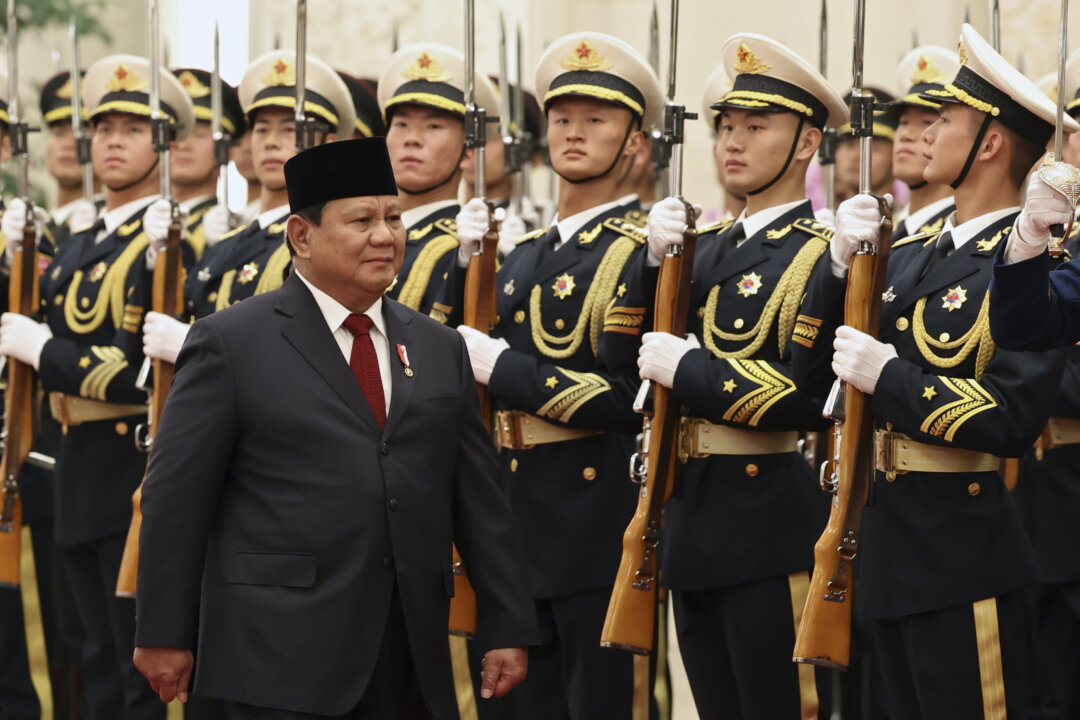Beijing has offered to support a free meals programme for Indonesia’s poor.
Indonesia’s newly inaugurated President, Prabowo Subianto, is reinforcing the strong economic ties with China established by his predecessor, Joko Widodo.
When Widodo ushered in an era of extensive trade and investment between his country and China, it was always clear that his hand-picked successor, Subianto, would follow the same path.
During his first official visit to Beijing since taking office in October, Subianto secured $15.5 billion (US$10 billion) in trade and infrastructure agreements, signaling continued collaboration between the two nations.
That was confirmed when he wound up a visit to Beijing before heading to the APEC summit in Peru.
During his two-day visit, he was granted access to a number of high-ranking CCP officials, including CCP leader Xi Jinping, Premier Li Qiang, and Zhao Leji, the chairperson of the National People’s Congress.
With Widodo having left a massive political legacy, Subianto is keen to make his mark on the country and its over 284 million people.
He sees one way of doing that as developing the country’s renewable energy capacity.
The deals encompass infrastructure, green energy, digital technology, and agriculture, and the two countries indicated they intended to increase the level of collaboration in green technologies such as alternative energy vehicles, lithium batteries, photovoltaics, and the digital economy.
One agreement established a formal Green Mineral Resources Partnership to support the two countries’ transitions to renewable energy.
Indonesia is one of the leading producers of many minerals, including bauxite, copper, tin, and gold.
The partnership also paves the way for Beijing to lead the development of industrial parks in Indonesia, particularly North Kalimantan Industrial Park.
That suggests China may play a significant role in the development of the new capital city, Nusantara. It is behind schedule and has yet to replace Jakarta as the capital, despite having been formally declared as such in August this year on the country’s independence day.
China is already Indonesia’s largest trading partner and a major source of greenfield and infrastructure investment.
In 2023, the total value of its trade with Beijing reached US$139 billion. The CCP’s investment in Indonesia totalled US$7.4 billion, making it the country’s second-largest foreign investor after Singapore.

However, Beijing’s existing activities in Indonesia are far from “green,” and many are controversial in terms of their environmental and social impact. For instance, large-scale mining projects funded by China, such as nickel extraction in Sulawesi, have led to deforestation, water pollution, and the displacement of communities.
Locals have also found themselves left out of employment opportunities on these projects in favour of foreign workers, and those who are employed complain of exploitation, including low wages and minimal protections.
One notable outcome of Subianto’s Beijing visit was an agreement for joint development in disputed South China Sea waters, including around the Natuna Islands.
This is likely to be of wider concern—especially to the United States and its allies, and Indonesia’s neighbours such as the Philippines.
The agreement includes cooperation on fisheries, oil, and gas exploration in the area, where Beijing’s “nine-dash line” claim—rejected in 2016 by a tribunal at The Hague—overlaps Indonesia’s exclusive economic zone.
As recently as in mid-October, Chinese vessels encroached into Indonesian territory near the Islands and were confronted by vessels from the Indonesian Navy and Coast Guard.
Beijing’s move was widely seen as testing Subianto’s new government.
It employed the same tactics when Widodo was in power, and initially, he reacted aggressively. In 2016, an Indonesian navy ship opened fire on a Chinese fishing boat, injuring one fisherman, and then detained several others. Seized fishing boats were sunk as part of Jakarta’s effort to deter foreign illegal fishing.
But later in his presidency—perhaps because he hoped to attract foreign investment and expand trade—his approach mellowed.
As the confrontations continued, the Indonesian government just reduced public confrontations.
The ascension of Subianto seemed to signal an end to this meek approach, though, when the Indonesian Coast Guard released a video showing its latest confrontation with a China Coast Guard vessel.
Instead, Subianto seems to be demonstrating that Indonesia can be a friend to Beijing, but will also stand up for itself if necessary while reaffirming its commitment to neutrality in disputes in the South China Sea.
Indonesia has long sought to maintain strong ties with both the United States and China, and Subianto is keen to preserve this balance.
He made a stopover in Washington, D.C., en route to Peru for discussions with President Biden and President-elect Trump.
Another concern to come out of the recent bilateral talks is Beijing’s financial backing of Subianto’s provision of free nutritious meals to Indonesia’s poor as part of his broader social welfare agenda.
During the visit, Subianto said he hoped to learn from China’s experience in improving living conditions.
“We want to learn from [the] Chinese experience, [particularly] how it has developed very rapidly in the last 30 years, especially in alleviating people from poverty,” said Subianto in his meeting with Li Qiang.
Beijing’s strategy throughout the Pacific has been to not just invest in business deals and hope the countries’ populations realise they have the CCP to thank for the flow-on effects, but to directly intervene to provide everything from disaster aid to national stadiums—all with a very high profile.
In this case, it is already ahead, as the Indonesian population has a net favourable view, and public opinion is also balanced between China and the United States, giving Beijing the opportunity to deepen its relationship with Jakarta without great risk of either political or popular backlash.

